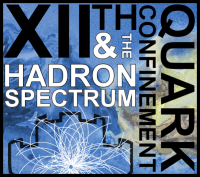Speaker
Description
Experimental measurements of muonic hydrogen bound states have recently started to take place and provide a powerful setting in which to study the properties of QCD. We profit of the power of effective field theories (EFTs) to provide a theoretical setting in which to study muonic hydrogen in a model independent fashion. In particular, we compute expressions for the Lamb shift and the hyperfine splitting.
These expressions include the leading logarithmic ${\mathcal O}(m_{\mu}\alpha^6)$ terms, as well as the leading ${\mathcal O}(m_{\mu}\alpha^5\frac{m_{\mu}^2}{\Lambda_{\text QCD}^2})$ hadronic effects. Most remarkably, our analyses include the determination of the spin-dependent and spin-independent structure functions of the forward virtual-photon Compton tensor of the proton to ${\mathcal O}(p^3)$, using HBET and including the Delta particle. Using these results we obtain the leading hadronic contributions to the Wilson coefficients of the lepton-proton four fermion operators in NRQED. The spin-independent coefficient yields a pure prediction for the two-photon exchange contribution to the muonic hydrogen Lamb shift, which is the main source of uncertainty in our computation. The spin-dependent coefficient yields the prediction of the hyperfine splitting. The use of EFTs crucially helps us organizing the computation, in such a way that we can clearly address the parametric accuracy of our result. Furthermore, we review in the context of NRQED all the contributions to the energy shift of $\mathcal O(m_r\alpha^5)$, as well as those that scale like $m_r\alpha^6\times$ logarithms.
